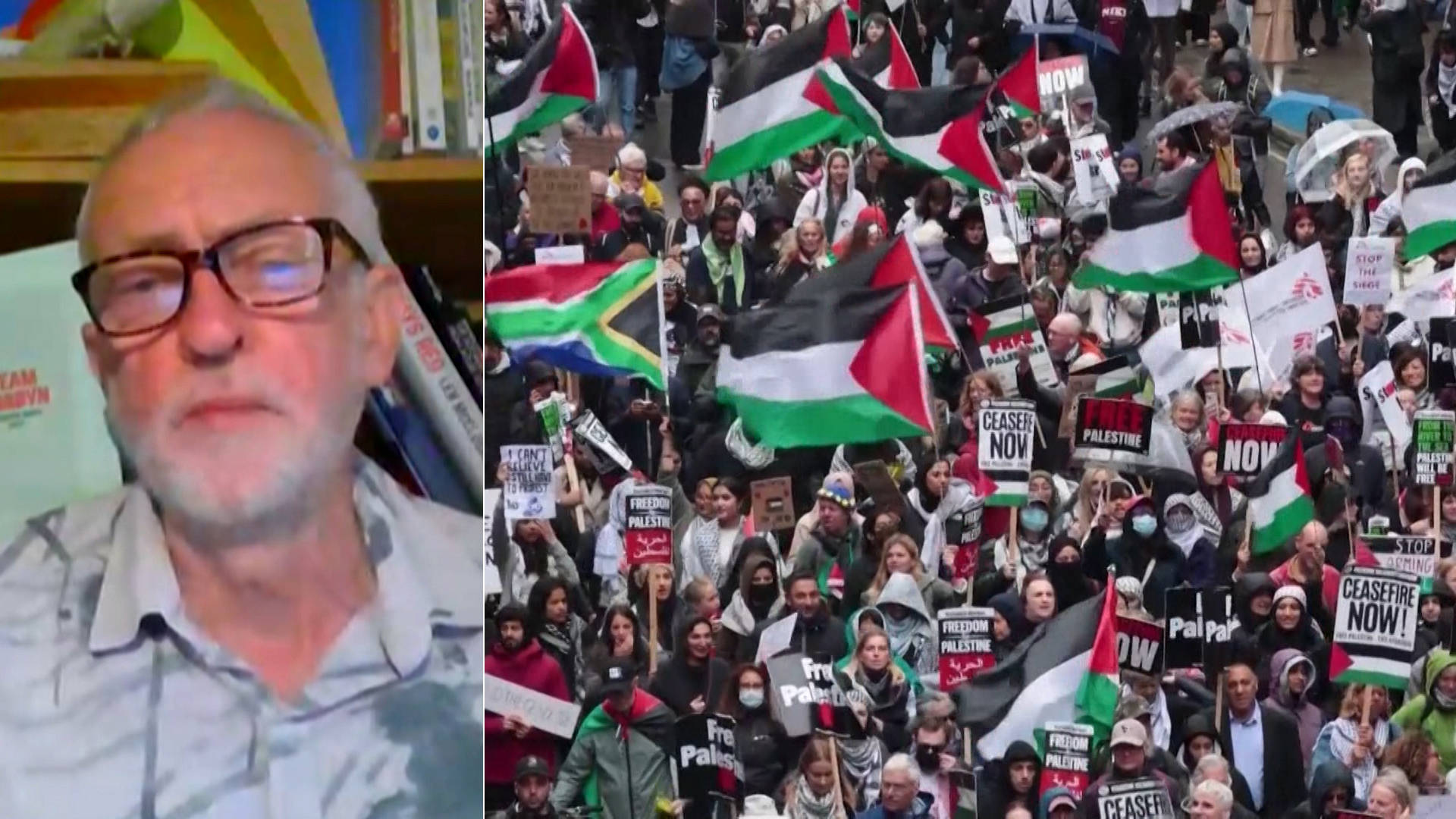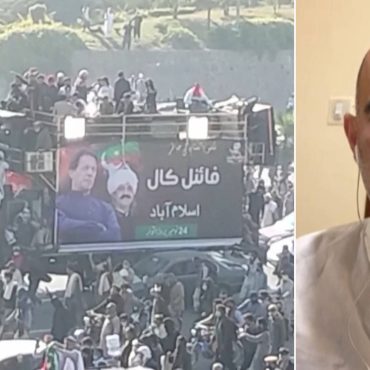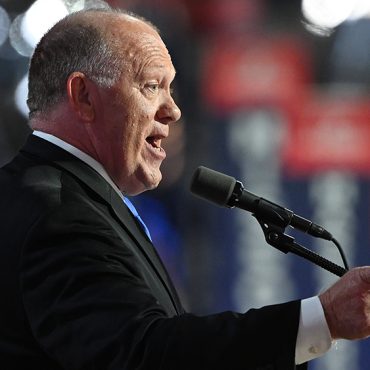This is a rush transcript. Copy may not be in its final form.
AMY GOODMAN: We begin today’s show in Britain, where the Labour Party won Thursday’s election and party leader Keir Starmer will become Britain’s new prime minister, putting Labour in power for the first time in 14 years. Starmer is a centrist politician who vowed to lead a government of, quote, “stability and moderation” in his first official address Friday.
PRIME MINISTER KEIR STARMER: We’ve changed the Labour Party, returned it to service. And that is how we will govern: country first, party second. Yet, if I’m honest, service is merely a precondition of hope. And it is surely clear to everyone that our country needs a bigger reset, a rediscovery of who we are.
AMY GOODMAN: Starmer’s new foreign minister, David Lammy, promised the now-ruling Labour Party will take a more balanced position on Israel and Palestine. In a phone call Sunday with Israeli Prime Minister Benjamin Netanyahu, Prime Minister Starmer reportedly said there’s an urgent need for a Gaza ceasefire, but also vowed the U.K. would continue its, quote, “vital cooperation with Israel.”
Meanwhile, more than 10,000 pro-Palestinian demonstrators marched through London Saturday calling for an immediate ceasefire, including former Labour leader Jeremy Corbyn, who easily retained his long-standing seat after running as an independent in his London district against the Labour Party.
JEREMY CORBYN: Stop the arms trade with Israel immediately. Stop the use of RAF Akrotiri as a base [inaudible]. And use their position immediately at the U.N. to demand complete recognition and a ceasefire now.
AMY GOODMAN: Among the other notable results in Thursday’s election, Conservative Liz Truss, the shortest-serving British prime minister at just 49 days, lost her seat in Parliament. Far-right figurehead Nigel Farage, best known for pushing Brexit, won his election in his eighth attempt to gain a seat. And Irish nationalists Sinn Féin became Northern Ireland’s largest party in the British Parliament for the first time.
For more, we’re joined by two people. Nesrine Malik is author and columnist for The Guardian, her latest piece, “Pro-Palestine votes aren’t ‘sectarian’. Dismissing them would be a dangerous mistake for Labour.” And we’re joined in London by British Parliament member Jeremy Corbyn, who served as Labour Party leader from 2015 to 2020.
We welcome you both back to Democracy Now! Let’s begin with Jeremy Corbyn. If you can talk about the significance of Labour’s victory and then your own? Though you’re the former Labour leader, like Keir Starmer, you are now voted — you now ran against Labour to retain your seat.
JEREMY CORBYN: Labour has clearly got a very large parliamentary majority and mandate from this election. There’s no question about that. There are over 400 Labour MPs. However, if you dig into the results, you find some quite interesting differences in this. The actual Labour vote nationally was less in this election than it was in 2019, and much less than it was in 2017. What’s happened in this election is the Conservative vote has collapsed, and much of that vote has gone to Nigel Farage and his far-right Reform party. They got over 4 million votes, even though I’m not sure they even contested every single constituency. And so, whilst Labour has this huge parliamentary majority, their national share of the vote was only around a third of all votes cast. It’s a very low mandate for a government to govern. And in fact, I think it’s the lowest mandate any government has ever had in Britain. So they need to be cautious about that.
The Labour vote went down in many constituencies, particularly in our urban areas, largely because of the stance on Palestine and Gaza, but also because they don’t think the Labour economic offer really meets the needs of the time. So, there are some huge issues going on here.
On my own case, I, as you know, was leader of the Labour Party until 2020, and I was denied entry to the parliamentary caucus of the Labour Party after an inquiry in later that year. And so I’ve been an independent MP, but a member of the Labour Party, ever since that time. The party then announced that I was not eligible to even apply to be the Labour candidate for Islington North. Many of my constituents were very angry about this and lobbied me to put my name forward as an independent, and say, “You cannot take this. We cannot take this. Please stand as an independent.” So I did.
And from nothing five weeks ago, we built an enormous campaign and won with 49.4% of the vote, not quite 50%, but almost there. And we had hundreds of volunteers come in from local communities, but all over the country. And we won the election on the principal positions of a ceasefire in Gaza and recognition of Palestine, on an economic strategy of redistribution of wealth and power by reducing taxation of the poorest, increasing taxation for the richest, and an absolute commitment to a Green New Deal and environmental policies, but particularly housing and stress issues in my constituency. So, we’re very proud that our constituency voted differently and gave me that mandate.
I’m joined now in Parliament by four other independents who were elected in different parts of the country. And we will be holding the government to account. I’ll be speaking out for local issues, but, crucially, we’re going to be establishing a local forum in which I will report every month on what I’ve been doing, but also all the local community campaign organizations will also be taking part. So, it’s a different form of politics. And I’ve now been elected 11 times from my constituency, and we’re very proud of the result we achieved.
AMY GOODMAN: So, in one of your first acts after your reelection, Jeremy Corbyn, you were out in the streets with tens of thousands of others. I’m wondering your response to the conversation that apparently the Israeli Prime Minister Benjamin Netanyahu had with Prime Minister Starmer, who reportedly said an urgent need for a Gaza ceasefire but also vowed the U.K. would continue its, quote, “vital cooperation with Israel.”
JEREMY CORBYN: Well, it sounds to me like there’s a contradiction in that conversation. Either you have a ceasefire or you don’t. And if you have a ceasefire, that means an end, surely, to the supply of arms to Israel, because we are complicit, as is the U.S.A., in the supply of weapons to Israel which have been used to bomb Gaza.
Forty thousand people have died in Gaza. Probably half of those are children. And the bombing has restarted again this morning. And many more are dying from hunger, malnutrition, dying from wholly preventable conditions like diarrhea and dehydration. And so, it is an absolutely urgent need.
And if the new government and the new foreign secretary, David Lammy, and the prime minister, Keir Starmer, really want to bring about a ceasefire, then they’ve got to say to Israel, “We will no longer occasion and supply you with weapons to bomb Gaza, and this ceasefire must be accompanied by withdrawal of Israeli forces both from Gaza and from the West Bank.” Otherwise, what’s going to happen? Is Israel going to start bombing again? Are those troops going to start moving tanks around in Gaza again?
This is a desperate humanitarian crisis brought about by the bombardment by Israel. And I’m not alone in saying this. I’ve had calls from people in Israel, even members of the Knesset — Ofer Cassif, for example — saying they absolutely agree with everything that we said at our rally outside Parliament on Saturday afternoon. The issue of Gaza has had a massive effect on the general election in Britain, and it’s not going to go away.
AMY GOODMAN: And finally, let me ask you about Starmer saying that the Rwanda deportation policy is buried and dead?
JEREMY CORBYN: I’m very pleased that the Rwanda policy is finished. It was always a horrible idea of, essentially, outsourcing our human rights responsibilities to refugees by deporting not all, but some of them, to Rwanda — very expensive deal in which the Rwanda government was given over 200 million pounds to facilitate this. I’m pleased that is over.
But — and this is a big “but” — the language used by some of the Labour front-bench leaders in the election about desperate people crossing the Channel to try and find a place of safety in Britain and about the issue of refugees in general was very, very unfortunate and very bad. We are in the midst of a global refugee crisis. Surely, the responsibility of the wealthiest countries in the world is to do two things: look at the causes of why people seek refuge, and, secondly, treat them as human beings, not as enemies or unwelcome arrivals. And the language that was used by the far right in France and other places and by Farage in this country is horrible and divisive and dangerous.
But I’m very pleased that the elections in France yesterday at least rejected the Le Pen far right. It doesn’t necessarily mean all of the migration policies in France are going to change overnight, but I think it’s a very important sign that when the left comes together, as it did through the alliance that was formed very rapidly in order to fight the second round of the French elections, they can both offer hope to working-class communities that have seen their living standards fall — in this case, in this country, by 20% in the past decade or so — and also stand up for human rights and the needs and rights of refugees.
The refugees come from countries where there’s been war. They come from Afghanistan, from Iraq. They come from Syria. They come from Libya. They come from places that have been subject to war and bombardment. And so, we need to wake up. Are we going to allow this decade to go on with wars in Ukraine, in Sudan, in Congo, in — obviously in Gaza, or are we going to be serious about bringing peace? And I would hope that there’s going to be pressure on the NATO summit next week to bring peace rather than more weapons and more war.
AMY GOODMAN: Finally Jeremy Corbyn, Jean-Luc Mélenchon of France has been described as the Jeremy Corbyn of France. Your assessment of this leader of the left?
JEREMY CORBYN: He’s a good friend, and we have worked together, and we had a very good time discussing lots of issues when we both attended, with the South Africans, the International Court of Justice hearing on the allegations of genocide against Israel brought by South Africa.
He has brought together a coherent left coalition with a very clear economic strategy in which he’s able to unite those that have been economically marginalized in France, as well as standing up against the rise of the far right and racism. I thank him for that, admire him for that and send him a message that I’m looking forward to meeting him again very soon and working with him, because the unity of progressive left and pro-human rights forces is a very important thing in our society. Are we to allow the economic inequality to dominate our lives, or are we going to do something about redistribution of wealth and power? That’s what I pledged in my election address, and that is exactly the mandate that I will carry into this Parliament.
AMY GOODMAN: Jeremy Corbyn, we want to thank you for being with us, independent British member of Parliament who ran against Labour to retain his seat. He was the Labour leader from 2015 to 2020, speaking to us from London.











Post comments (0)